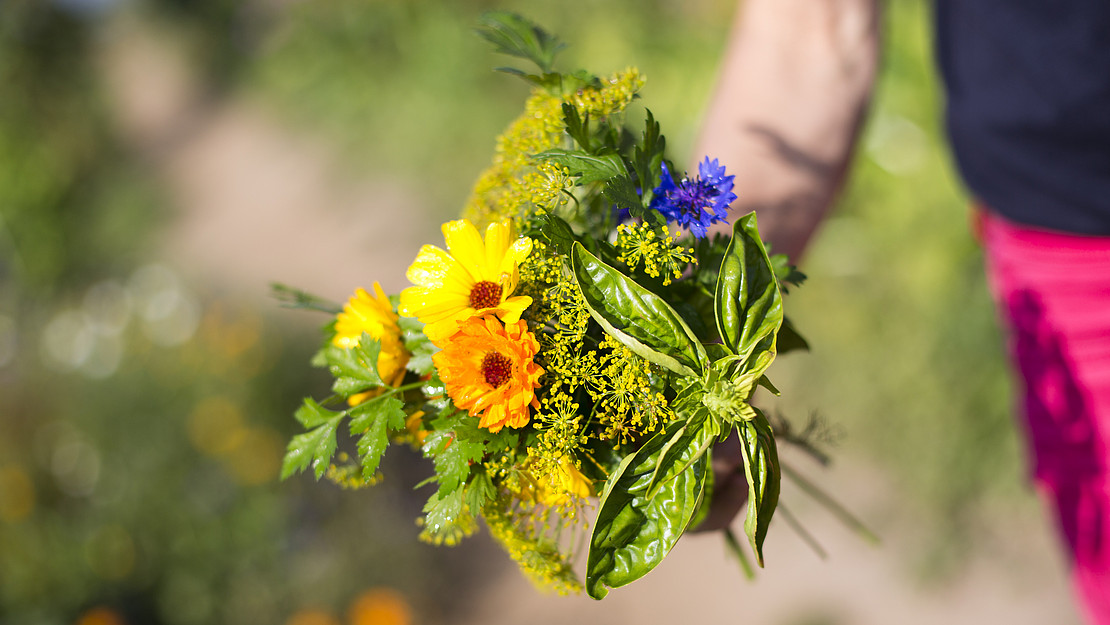Training as a gardener specializing in ornamental horticulture
The content on this page was translated automatically.
 Image: Sonja Rode
Image: Sonja RodeWhat does a horticulturist specializing in ornamental horticulture do at the University of Kassel?
At least a good secondary school leaving certificate should be available at the time of the start of training. The grades in German and mathematics should be at least "satisfactory" or better on the school leaving certificate.
The working hours are 40 hours per week. There are fixed working hours from Monday to Friday from 7:45 to 16:15.
The training program for horticulturists specializing in ornamental horticulture has a dual structure and lasts three years. Trainees work in the Mathematics and Natural Sciences Department's own greenhouse, where they gain practical experience right from the start.
Theory is taught on certain days of the week at the vocational school, the Willy Brandt School in Kassel.
As an apprentice gardener specializing in ornamental horticulture, you will learn the following during the theory phase at vocational school:
1st year of training
In the first year of training, as a prospective gardener, you will learn everything about plants and their use in theory during 2 vocational school days per week. There is a strong focus on nature conservation and environmental protection, for example in teaching environmentally conscious construction and maintenance measures. Other focal points are the organization and marketing of the training company.
2nd year of training
The second year of training is largely used to consolidate what you have already learned and to prepare for the intermediate examination. You will also learn the difference between the various types of farm equipment and how to organize work processes correctly. Instruction is limited to one day of vocational school per week.
3rd year of training
In the last year of the apprenticeship, the focus is on the chosen area of specialization, in which you acquire subject-related knowledge. This is taught on a second vocational school day per week. In the case of ornamental horticulture, for example, trainees learn more about sales procedures, opportunities for further training and assistance in preparing their main crop for the final examination.
What does a horticulturist specializing in ornamental horticulture earn at the University of Kassel?
A monthly training allowance is paid in accordance with Section 8 (1) of the Collective Agreement for Trainees of the State of Hesse (TVA-H BBiG). This currently amounts to
- 1,126.85 EUR in the 1st year of training
- 1,181.43 EUR in the 2nd year of training
- 1,231.51 EUR in the 3rd year of training
What kind of guy do I have to be to become a horticulturist specializing in ornamental horticulture?
Athletes: As a horticulturist specializing in ornamental horticulture, you must have a certain level of physical fitness. You will often work in the same posture, such as kneeling or squatting, for long periods of time. You should also be reasonably strong because you will often be carrying heavy bags of soil or fertilizer.
Nature lovers: Gardeners specializing in ornamental horticulture work outdoors for most of their working hours - in sun, rain or snow. That's why you shouldn't mind the different weather conditions, because you always like to be out in the open air.
Perfectionist: In ornamental horticulture, we work with delicate and filigree seeds or seedlings that have to be separated. That's why you should handle the plants responsibly and work very thoroughly.
Tell us about your training
The profession of a horticulturist is multifaceted, there is work to be done in the greenhouse as well as outdoors. One accompanies the plant from seedling to its planting and sale. It is necessary to pay attention to the optimal care of the plant, which includes the nutrient requirements, the choice of substrate and the use of fertilizers. In addition, prevention of diseases and pests play an important role in the growth process.

Why did you decide on an apprenticeship and specifically on this one?
After graduating from school, I specifically didn't choose to study because I wanted to create professional security for myself and gain practical experience for the time being. Since my first internship in 9th grade, I have been interested in horticultural professions, regardless of the field. During the internship I also became aware of the profession of landscape architect and later I was able to gain practical experience in the field of vegetable gardening and horticulture and landscaping. These experiences strengthened my decision to choose a new specialty. After the training as a gardener I have the wish to start a study to become a landscape architect and to use my learned knowledge.
What else would you like to pass on to others?
I personally have been informed by many that the field of "ornamental horticulture" is less and less represented. For this reason, I would like to convince more people to choose and support this field. Industrialization is making the profession more common, which means that manual skills are being lost. Here at the University of Kassel, the job description, as well as the associated learning content, is taught very well. For anyone who wants to study, I recommend gaining practical experience in advance, so that you can bring what you have learned into your subsequent studies.
Ask yourself beforehand if you ...
- have a green thumb.
- are "weatherproof".
- like to dig in the ground.
Or if ...
- your houseplants don't survive long.
- you prefer a desk job.
- you want to use your foreign language skills for your work.
Go link of this page: https://www.uni-kassel.de/go/ausbildung-gaertner